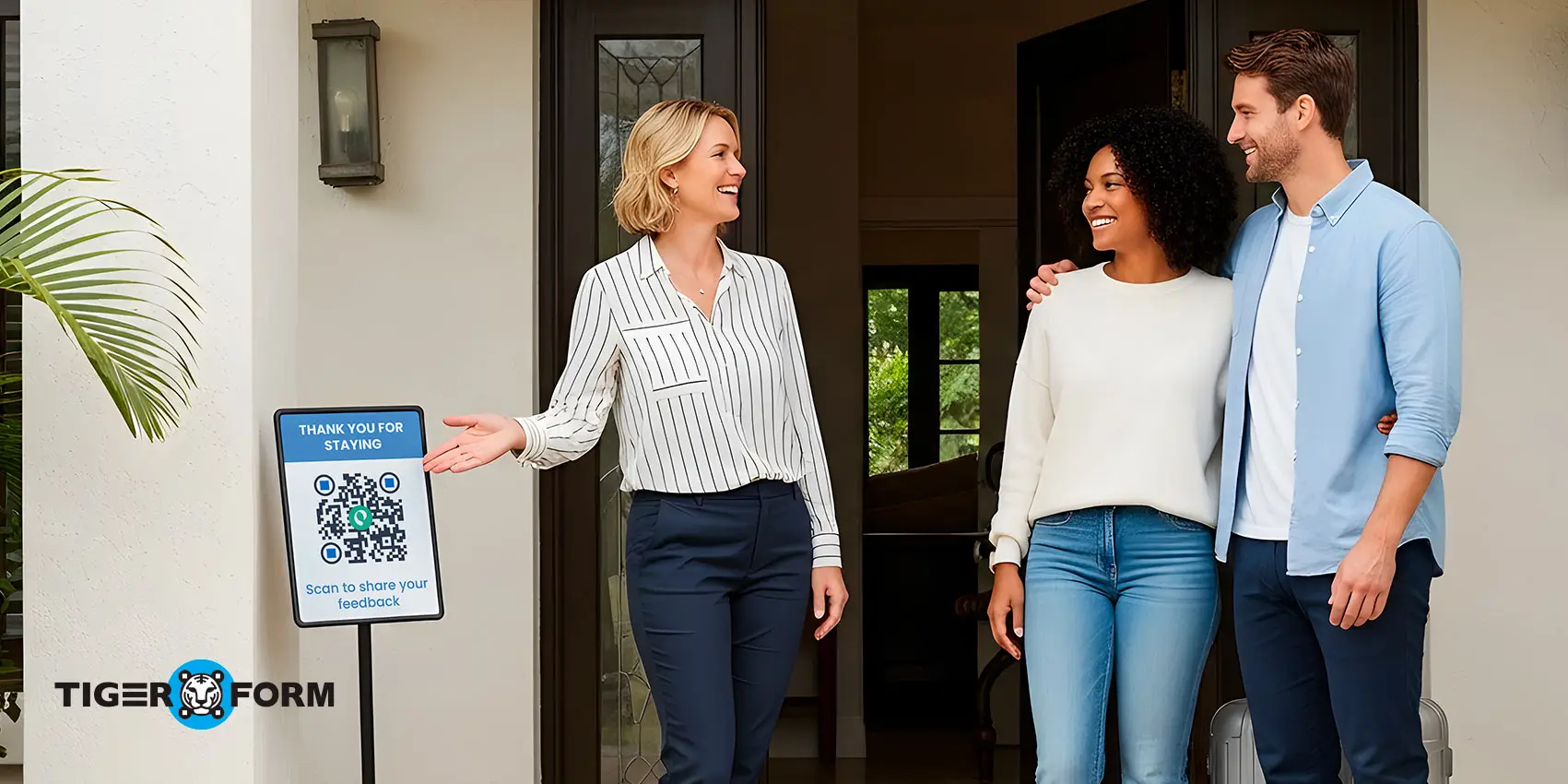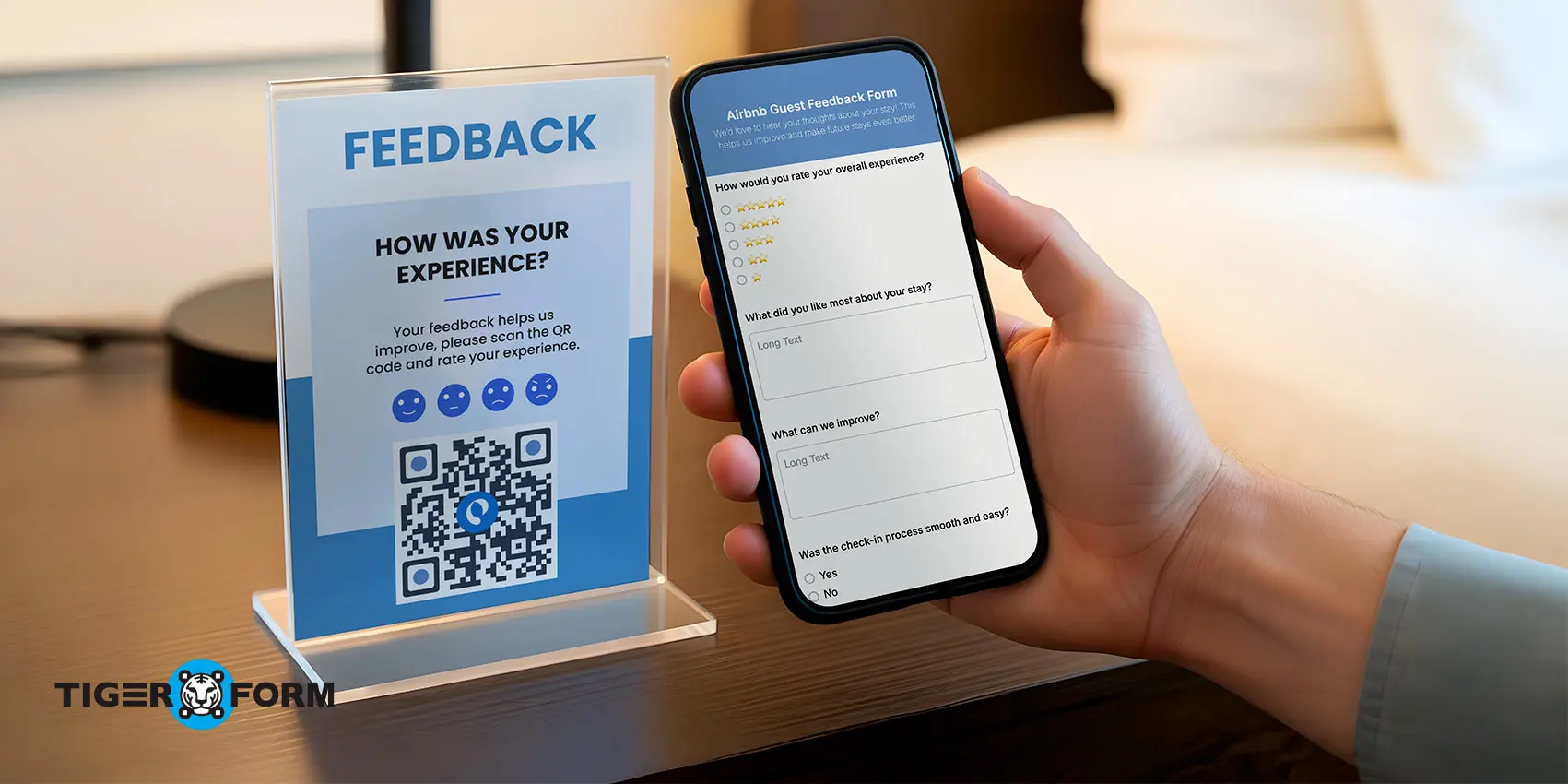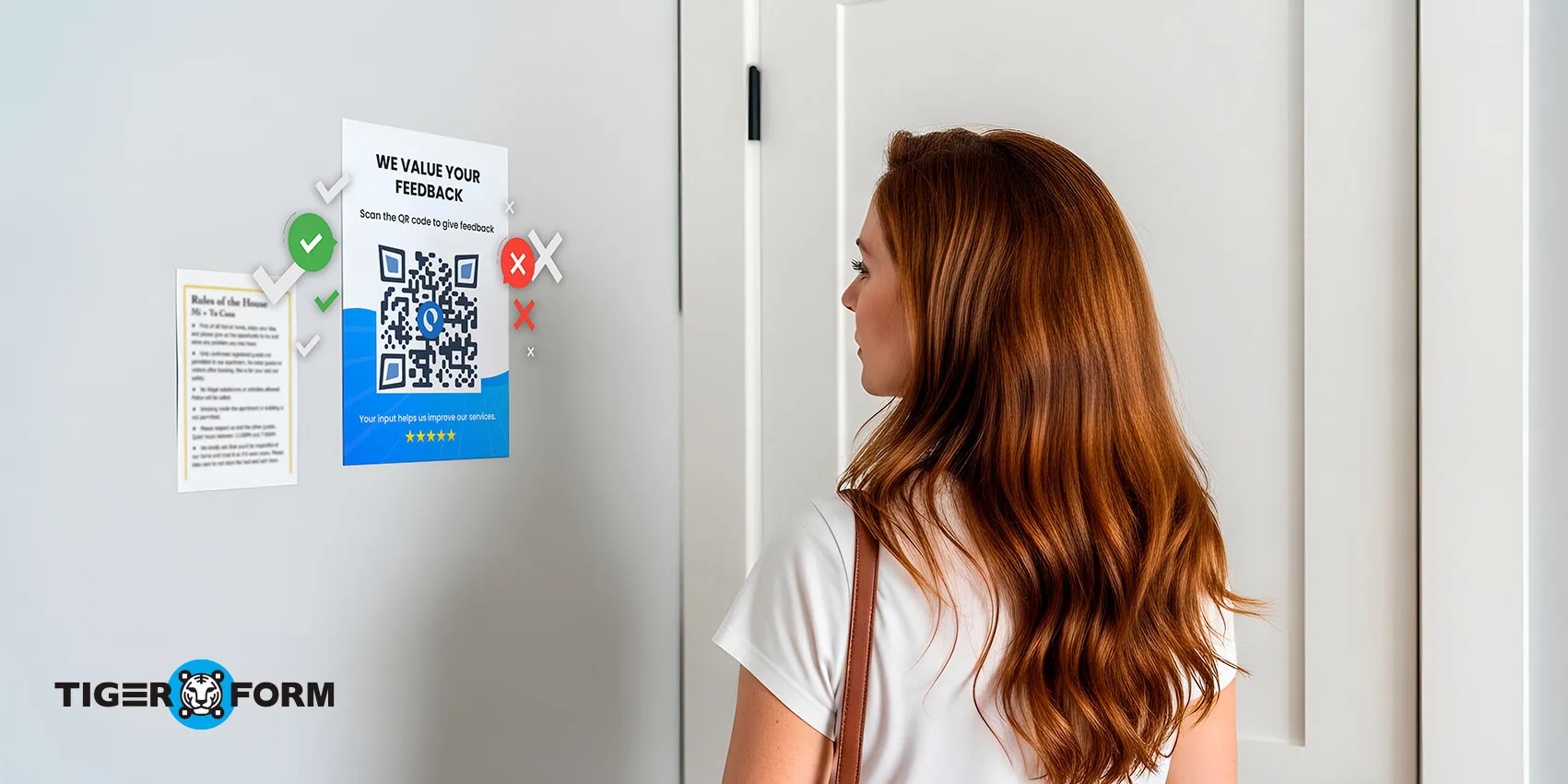
A guest satisfaction survey gives your guests a private space to share their feedback. If there are aspects of your Airbnb service that they find unsatisfactory. You don’t want guests to air them publicly, which might discourage potential customers.
A well-structured survey flow ensures guests can share their thoughts comfortably, and guests often won’t speak up unless you ask. That’s why asking with a survey is needed.
This guide will help you dive deeper into the basics of guest surveys. We’ve included different types and sample questions you can use, plus some helpful tools, like QR code forms, to assist you in building effective Airbnb customer surveys.
What are guest satisfaction surveys?
Satisfaction surveys are tools Airbnb hosts use to gather structured feedback from guests about their stay. They usually consist of rating-scale questions, multiple-choice items, and open-ended prompts. These surveys are typically sent via email, SMS, or automated systems shortly after checkout.
They go beyond star ratings by uncovering the specifics of a guest’s experience, from how clean the bathroom was to how easy it was to find the front door.
The goal is to identify areas for improvement and replicate what guests loved. A good survey should feel short, relevant, and respectful of your guests’ time.
Why conduct a guest survey for your Airbnb business?

You may think reviews are enough to measure guest satisfaction, but they only tell part of the story. Reviews are public and often filtered through social etiquette, so guests might hold back on criticism or gloss over problems they experienced.
Guest surveys, on the other hand, are private. This makes guests feel safer sharing honest and constructive feedback. Here’s why you should make them part of your check-in and out process:
1. Identify hidden problems
Some issues don’t make it into reviews but still impact the guest experience. The AC unit may be noisy, or the shower pressure may be weak. You won’t know unless a customer or maintenance team informs you. A survey makes it easier for guests to do so.
2. Prevent negative reviews
Catching problems early allows you to fix them before they appear in a public review. If a guest mentions an issue through a guest feedback form you provided, you can address it in your next turnover or even offer a follow-up apology to prevent poor feedback.
3. Enhance your listing details
When guests share what they loved, you can emphasize those strengths in your Airbnb listing, like mentioning your ultra-soft bedding, blackout curtains,
or fast Wi-Fi.
4. Build guest loyalty
Asking for feedback shows guests that you care about their experience. This human touch can turn one-time visitors into loyal fans who rebook or refer others.
5. Improve operational efficiency
Survey insights and AirBnB statistics help streamline operations. If multiple guests complain about a complex check-in, it’s time to simplify the instructions. If guests keep praising the local guidebook, maybe it’s time to make it more prominent.
What types of questions should you ask in a satisfaction survey?
1. Rating scale questions (Likert scale)
This type of question asks guests to rate a specific aspect of their stay on a numeric scale, often from one to five or one to 10. They’re particularly effective for quantifying satisfaction and identifying trends across multiple guests.
Using the same scale throughout the survey is best to keep your data consistent and avoid confusion. Switching between scales can make interpreting results harder.
Example: “On a scale of 1 to 5, how would you rate the cleanliness of the property?”
2. Multiple choice questions
When you want to understand guest preferences or behaviors, multiple-choice questions offer a structured format that’s easy to analyze.
Guests can choose from a list of options, and you can include the ability to select more than one if needed. To ensure clarity, make sure options are distinct and consider adding an “Other” field for responses that don’t fit predefined categories.
Example: “What was your primary reason for visiting?”
Choices: ☐ Business ☐ Leisure ☐ Family visit ☐ Event ☐ Other (please specify)
3. Open-ended questions
Unlike structured formats, open-ended questions allow guests to express their thoughts, stories, or suggestions freely. These responses often reveal deeper emotional takeaways and unexpected feedback that other formats might miss.
While incredibly insightful, using them sparingly is best to keep the survey from feeling too long.
Example: “What was the most memorable part of your stay?”
4. Yes/no questions
These provide a quick and straightforward way to gather binary feedback: something occurred or didn’t.
They help confirm whether basic expectations were met and can act as indicators for areas needing attention. When used strategically, these questions can trigger follow-ups for more profound insight.
Example: “Did you find the check-in instructions clear?”
5. Follow-up questions (conditional logic)
These questions are only shown based on how a guest answers a previous one, which keeps the survey personalized and relevant. For instance, if a guest rates cleanliness poorly, you can follow up by asking what felt unclean.
This approach helps you gather detailed feedback without overwhelming the guest with unnecessary questions. Used wisely, follow-up questions turn basic feedback into actionable insights.
Example: “Can you share what specifically felt unclean during your stay?”
Insider tip: Structuring the survey flow
Start with easy, general questions to build momentum, then move into more specific areas. End with optional open-ended questions so guests can elaborate if they choose.
Key Airbnb guest survey questions for every part of the guest experience

Accuracy of listing
- How accurately did the description match the property?
- Were the listing photos representative of the actual space?
- Were any amenities missing or misrepresented?
- Was the neighborhood as described?
- Did anything surprise or disappoint you based on the listing?
- Was the layout of the property as expected from the listing?
- Were the amenities listed accurately?
- Did the listing description set realistic expectations?
- Were check-in/check-out times noted on the listing?
Cleanliness
- How would you rate the cleanliness upon arrival?
- Were the bathrooms clean and fully stocked?
- Were the linens and towels fresh and clean?
- Did the kitchen meet your expectations for cleanliness?
- Were there any noticeable odors?
- Was the trash properly disposed of before your arrival?
- Were floors and surfaces clean and dust-free?
- Was anything in need of repair or deep cleaning?
- Did you notice any pests or insects?
- How would you rate the overall hygiene of the space?
Communication and hospitality
- How responsive was the host before your arrival?
- Was the communication clear during your stay?
- Was the host proactive in offering help or recommendations?
- How quickly did the host respond to questions or issues?
- Was the tone of communication friendly and respectful?
- Did you feel welcomed by the host?
- Were instructions and house manuals easy to understand?
- Were you informed of everything you needed before check-in?
- Did the host provide helpful local tips or resources?
- How would you rate the host’s overall helpfulness?
Location and surroundings
- Was the property easy to find?
- How walkable was the area?
- Was the neighborhood safe and comfortable?
- Was the area quiet or noisy?
- Was public transportation accessible from the property?
- Were nearby amenities conveniently located?
- Were there restaurants or shops nearby?
- Was the property conveniently located to your activities?
- Was parking available as described?
- Was the surrounding environment clean and well-maintained?
- Would you choose this location again?
Check-in experience
- How easy was it to access the property?
- Were the check-in instructions clear and complete?
- Did you experience any issues during check-in?
- Was the key retrieval process straightforward?
- Did the host assist you if you needed help checking in?
- Were you greeted personally or left to self-check in?
- Was the check-in time flexible if needed?
- Was the process stress-free?
- Was there sufficient lighting at the entrance?
- How would you improve the check-in process?
Comfort and amenities
- Was the space quiet and restful?
- Was the bed comfortable?
- Were the heating/cooling systems adequate?
- Did you use all the listed amenities? Were they in working condition?
- Was the space well-equipped for your needs?
- Was there enough privacy?
- Did the furniture meet your comfort expectations?
- Was the bed comfortable?
- Were there enough pillows and blankets?
- Were heating and cooling systems easy to use and effective?
- Was the Wi-Fi reliable and fast?
- Was the kitchen equipped with everything you needed?
- Were toiletries and essentials (toilet paper, soap) provided?
- Did you use the TV or entertainment systems? Were they functional?
- Was the water pressure and temperature satisfactory?
- Did you feel you had adequate privacy?
Value for money
- Do you feel the price of what you received was fair?
- Were you satisfied with the total cost of your stay?
- Were there any unexpected fees or charges?
- How does this stay compare to other places at a similar price?
- Did the quality of service match the price?
- Would you consider this property a good value?
- Did the amenities add value to your stay?
- Was the property’s condition worth the nightly rate?
- Did you feel the experience met or exceeded your expectations?
- Would you book this property again at the same price?
Safety
- Did you feel safe inside the property?
- Did you feel safe in the surrounding neighborhood?
- Were the door locks and windows secure and functional?
- Were smoke detectors and fire extinguishers available?
- Was emergency information provided?
- Was the exterior well-lit at night?
- Was there a first aid kit or emergency supplies?
- Were there any hazards or safety concerns?
- How safe did you feel in the neighborhood?
Check-out experience
- Was the check-out process clearly explained?
- Did you have enough time to check out comfortably?
- Were check-out tasks (e.g., taking out trash) reasonable?
- Did the host follow up after check-out?
- Was it easy to return keys or access codes?
- How would you improve the check-out process?
Extra touches
- Were there any welcome gifts, snacks, or thoughtful gestures?
- Did the decor or ambiance make the stay more enjoyable?
- Did the host provide extras (e.g., bikes, games, guidebooks)?
- Were there personalized or memorable details?
- Did you feel like the host went above and beyond?
Overall experience
- Did your stay exceed your expectations?
- What part of your stay could use the most improvement?
- How does this Airbnb compare to your favorite stay to date?
- Would you consider becoming a repeat guest?
- Did the property make your trip more enjoyable overall?
- How memorable was your stay here, and why?
- Did the experience make you more or less likely to use Airbnb again?
- Did anything during your stay cause significant inconvenience?
- Was there anything exceptional about this property worth highlighting?
- If you were to review this listing, what would your headline say?
How do you create a good guest satisfaction survey?
Choose the right form builder
Pick a survey tool that allows mobile-friendly formats, branching, analytics, and wide integrations. Online form makers like Google Forms or TIGER FORM work well.
Keep it short and focused
According to Hubspot, aim for a number of questions that would fit about 10-14 minutes. Prioritize quality over quantity. Cover each phase of the guest journey without overloading the user.
Make it visually simple
To make your survey skimmable, use large fonts, plenty of white space, and buttons that are easy to tap on phones.
Use friendly, clear language
Avoid formal or robotic phrasing. Be human: “How did you like the bed?” is better than “Evaluate the quality of the sleeping apparatus.”
Customize based on stay type.
A family staying for two weeks has different needs from a solo traveler on a weekend trip. Ask relevant questions when possible.
Test before sending
Always test your survey on both desktop and mobile before distributing it. If you get feedback from a friend, you get bonus points.
Do’s and don’ts of conducting guest surveys

Do’s
- According to Qualtric’s data, over 50% of surveys today are done on mobile devices. So, you need to design your survey to be mobile-friendly.
Bonus tip: Want to make it effortless for guests to access your survey? Use a tool like TIGER FORM to create forms that automatically generate a QR code.
How to create a simple form for your surveys:
Step 1
Use a form QR code generator to make a survey form.
Step 2
Start fresh or pick a ready-made template for your survey.
Step 3
Add your questions and response options from our question list.
Step 4
Check how the form looks across devices before finalizing it.
Step 5
Generate the QR code that directs people to your survey.
Step 6
Change the QR code’s style to match your brand (colors, logo, etc.).
Step 7
Share the QR code online through email or as part of your social media marketing efforts. You can also print it for physical use.
For a clearer guide to using TIGER FORM to create forms, watch this video:
- Send your survey within 24–48 hours after check-out, because that’s when the guest’s experience is still fresh and their feedback will be the most accurate and detailed.
- According to SurveySparrow’s research, keep your surveys short and sweet, ideally 3–5 minutes max. Longer surveys often lead to drop-offs and lower response rates by 10%.
- To show appreciation and increase completion rates, include a thank-you message or a small incentive, like a discount for a future stay or a local digital guide.
- Use clear, casual, and friendly language throughout. Guests are more likely to respond when they feel like talking to a real person instead of reading legal fine print.
- Let guests know the purpose of the survey upfront, so they understand their input is being used to improve future stays; transparency builds trust.
- Ask a mix of rating-scale and open-ended questions to gather quantitative insights and qualitative depth without overwhelming the guest.
- Test your survey before sending it out to catch any confusing wording or technical glitches that might frustrate your guests.
- Organize questions in a logical, chronological flow, following the renting experience from booking through check-out; this makes it easier for guests to recall and reflect.
- Review and update your survey questions regularly as your Airbnb evolves or you notice new trends or concerns in guest feedback.
- Follow up actively on the feedback you receive because a survey is only valuable if it leads to action, whether fixing an issue or enhancing a great feature.
Don’ts
- Don’t overload your survey with too many open-ended questions, as they require more time and mental energy, which can deter busy guests from finishing.
- Don’t be defensive or dismissive about negative feedback; even harsh or unfair critiques often reveal an opportunity to improve.
- Don’t wait too long to send your survey, since sending it a week or more after check-out means the experience will feel distant, and your response rate will likely plummet.
- Don’t be vague about why you’re asking for feedback. Guests appreciate transparency and are more willing to help when they know their opinion matters, especially when it’s an anonymous survey forms.
- Don’t rely solely on 5-star ratings as your benchmark for success. Consistent patterns in 3- or 4-star responses can be more telling than a perfect average score.
- Don’t include irrelevant or overly complex questions, as this can confuse guests and reduce the quality of responses.
- Don’t copy-paste generic questions from other surveys. Your Airbnb has its personality, and your survey should reflect that.
- Don’t ignore the emotional aspect of a guest’s experience, since how they felt during their stay is often more important than just what they used or saw.
- Don’t fail to acknowledge your guests’ time and effort. Skipping a simple thank-you makes the interaction feel transactional rather than thoughtful.
- Don’t spam or repeatedly remind guests to fill out the survey, as one polite reminder is plenty; being pushy can damage the goodwill you’ve earned.
What to do after you receive survey responses
1. Review and categorize feedback
Segment responses into categories like cleanliness, amenities, check-in, etc. Use a spreadsheet or feedback tool to sort and color-code them for easy review.
2. Look for trends, not one-offs
If one guest disliked your mattress, that might be personal preference. But if five guests mention it over time, it’s a red flag.
3. Take action
Fix what you can; swap old towels, simplify check-in, replace light bulbs. When guests see improvements, they’re more likely to leave positive Airbnb guest reviews.
4. Respond when appropriate
If a guest shares detailed feedback, especially negative, thank them and offer a gesture like a discount for a future stay or a sincere follow-up.
5. Use data to optimize your listing
Highlight positive mentions in your Airbnb description. “Guests love our fast Wi-Fi and quiet neighborhood” is social proof backed by honest feedback.
6. Track feedback over time
Tracking changes in customer satisfaction surveys is essential for making smart, data-driven decisions. With TIGER FORM, you can automatically monitor your survey’s performance (scans and submissions) using the built-in analytics on the platform’s dashboard.

Increase your bookings and ratings with guest surveys
Now you know why your bookings or ratings may have fallen short and, more importantly, how to turn things around. We’ve created this guide to help you use guest feedback effectively and improve your Airbnb. We hope you find it valuable.
We’ve covered asking the right questions, gathering meaningful responses, and turning insights into real improvements. When you act consistently on guest feedback, you won’t just get better reviews—you’ll create stays people want to return to.
More insight leads to better hosting and more bookings. Start building your first guest satisfaction survey form today and take the next step toward five-star stays.
FAQs
Are guest surveys allowed under Airbnb’s policies?
Yes, Airbnb allows hosts to send private surveys to guests. However, offering incentives specifically for positive reviews violates Airbnb’s policies.
How do I ensure guest feedback is honest and unbiased?
Keep surveys anonymous, ask neutral questions that don’t lead guests toward particular answers, and clarify that you value all positive and negative feedback.
How often should I send surveys?
For most hosts, sending a survey after each guest’s stay provides the freshest feedback. However, if you host large groups or have back-to-back bookings, you might survey only the primary guest to avoid survey fatigue.
